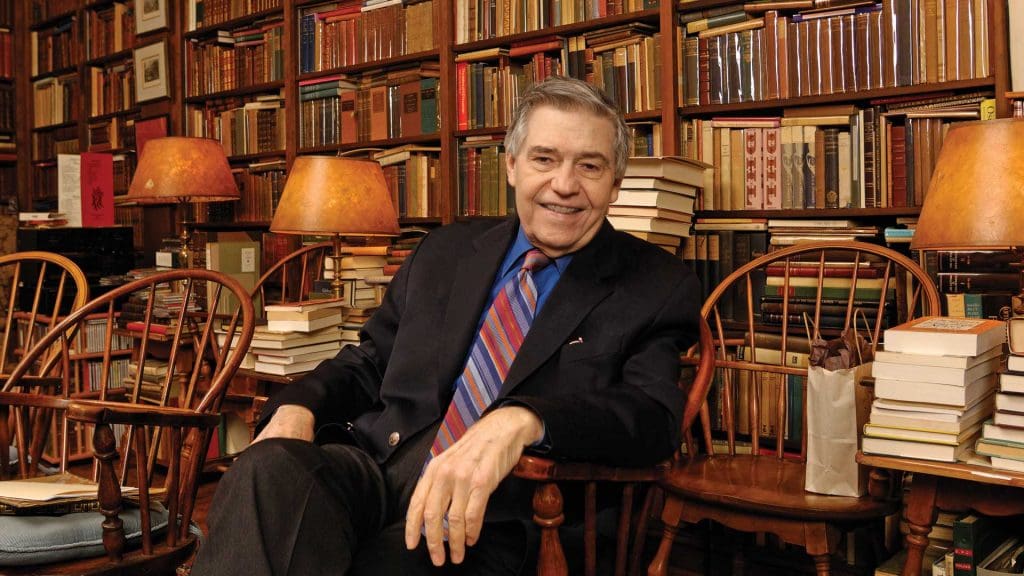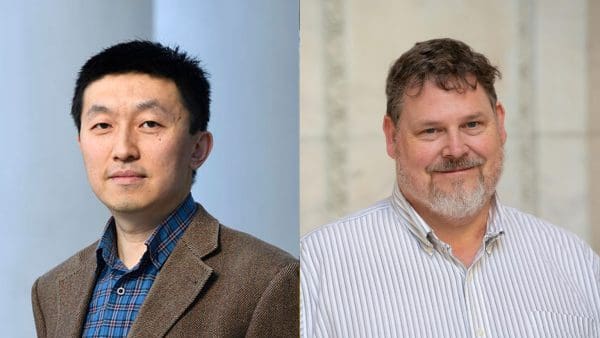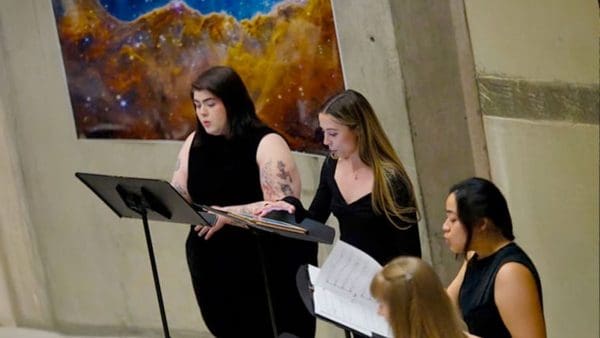
Richard A. Macksey ’53, MA ’54, PhD ’57, a legend not only in his own fields of critical theory, comparative literature, and film studies but across all of the humanities, died July 22 in the Baltimore area after an illness. He was 87.
“Legend” doesn’t really sufficiently describe Macksey, who managed to fuse enormous intellectual achievement with a deeply human nature. He was a man who read and wrote in six languages; was instrumental in launching a new era in structural thought in America; maintained a celebrated library of more than 70,000 books and manuscripts in his home; inspired generations of students to follow him to the thorniest heights of the human intellect; and penned or edited dozens of volumes of scholarly works, fiction, poetry, and translation.
Macksey loved classical literature, foreign films, comic novels, and medical narratives—all subjects he taught at one time or another. Conversations with him were renowned for the way they leaped from one topic to another—all connected by his seemingly boundless knowledge, prodigious memory, and sense of humor—and surprised his interlocutors into new levels of understanding. For many at Hopkins and far beyond, he was no less than the embodiment of the humanities both in intellect and spirit.
“From the very start, our department has been committed to questions at the intersection of literature, philosophy, and aesthetics, and Dick epitomized this tradition in everything he did,” says Lisa Siraganian, associate professor and J. R. Herbert Boone Chair in Humanities, who chairs the Department of Comparative Thought and Literature. “For over three decades he developed and nurtured the department’s thriving humanities honors curriculum; served as the longtime editor-in-chief of the comparative literature edition of our home journal, Modern Language Notes; shared his vision of the humanities at the School of Medicine; and mentored hundreds of undergraduates, graduates, and faculty members. He was incomparable—and will be deeply missed.”
After beginning his undergraduate studies at Princeton, Macksey transferred to Hopkins and earned a bachelor’s degree in 1953 and master’s degree in 1954, both in the Writing Seminars. He went on to earn a doctorate in comparative literature from Hopkins in 1957 and returned to Hopkins as assistant professor in the Writing Seminars a year later.
In 1966, Macksey led the charge in founding the Johns Hopkins Humanities Center as a meeting ground and incubator for problems, ideas, and discussions across disciplines. Macksey served as its director from 1970 until 1982 and was a professor on its faculty until his retirement in 2010. In January 2018, the center was renamed the Department of Comparative Thought and Literature. Macksey continued to teach several courses until as recently as spring 2018.
Also in 1966, Macksey and colleagues convened an international symposium at Hopkins called “The Languages of Criticism and the Sciences of Man.” It was the first time that many leading figures of European structuralist criticism presented their ideas to the American academic community, throwing open a new conduit to avant-garde French theory and placing Hopkins at the center of intellectual conversation.
Famous for his generosity of spirit with everyone he met, Macksey held joint appointments in the Writing Seminars and in History of Medicine at the Johns Hopkins School of Medicine, where he co-directed the humanities programs starting in 1990.
In 1972, Macksey and his wife, Catherine Macksey, converted the garage of their Guilford home, just blocks from the Homewood campus, into a library. The collection is as far-ranging as his interests, covering every genre in just about every language. Macksey and his students and friends competed with those books for space around a table late into the night, often fueled by cookies and the smoke from his ever-present pipe, and surrounded by works of fine art.
Macksey received numerous awards over the years. Among them: the university’s George E. Owen Teaching Award (1992), given annually for outstanding teaching and devotion to undergraduates; and the Johns Hopkins Alumni Association’s Distinguished Alumni Award (1999) in recognition of his remarkable career. Also in 1999, the Richard A. Macksey Professorship for Distinguished Teaching in the Humanities was established. The Alexander Grass Humanities Institute hosts the Richard A. Macksey Lecture annually.
To learn more about the man, his books, and his legacy, visit: bit.ly/macksey




